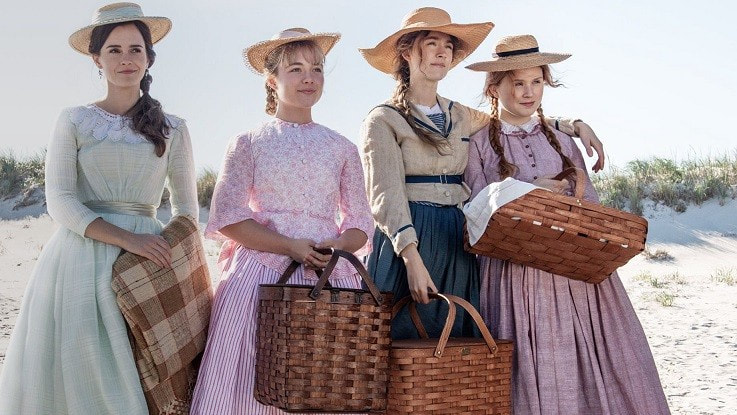Gerwig further differentiates her version from the most recent Gillian Armstrong 1994 adaptation with the oft-hated character of Amy. Where Anderson cast a younger and older actor for the character, Gerwig sticks with Pugh throughout. It’s normally a pet peeve when actors in their 20’s, as Pugh was during filming, are cast to play teens or, in this case, a girl of around twelve, but Pugh’s complete commitment to the facial contortions of the occasionally-petulant and always-energetic character is a revelation. Where Meg is consistently romantic and devoted, Jo consistently contrarian and spirited, and Beth consistently gentle and charitable, Amy is two believably polar halves in each time period. Her frivolous younger self is in thrall to her older sisters, and her older, poised, focused self is in thrall to no one. Pugh is entrusted with a monologue that is both resistant and acquiescent to the gender norms of the mid-19th century, and for its perceptive and lacerating truths to land most effectively, it must be delivered by someone capable of thinking it. Pugh, in the film’s best performance, is both a person who can sell that monologue while also convey a childhood foolishness that would have her get her foot stuck in a mold.
While Pugh’s castmates have less difficult tasks to complete, they are all fantastic in their own right. Ronan has put together a resume that makes her the best actor of her generation, especially in her work with Gerwig. Most of the film centers Jo, who gives a similar monologue to Amy’s and Ronan unsurprisingly delivers in communicating how her literary aspirations are colliding with the isolation inherent to writing. That speech is delivered to Dern’s Marmee, another actor who could be called the best of her generation (did I mention that Streep is also lurking around the edges of this film?). The radiating goodness of the March household has to come from somewhere, and Marmee comes across as eminently capable of building a place that pulls in everyone who comes into contact with it. She sees much of herself in Jo, and it’s easy to imagine a young Dern with Jo’s giant dreams, only to have them compromised and making the best out of it anyways. Watson and Scanlon both beautifully realize their characters, with the former showing that submission to the expected roles of the time doesn’t have to be a spiritual death sentence and the latter embodying the depth of genuine feeling at stake if her illness gets the better of her. Lastly, of the main cast, Chalamet’s fuck-boy energy is so well-suited to Laurie, a young man unaccustomed to not getting what he wants while also in possession of no small amount of past tragedy. An unofficial fifth March in the earlier timeline, Laurie is hardly the only person who yearns to be in the family’s circle, but he wants it the most.
Lady Bird radiated with a love of its characters, no matter how small the role, and Little Women does as well. There’s endless material to be had with the March family, but Gerwig finds more time for supporting characters like Laurie’s caretaker uncle Mr. Laurence (Chris Cooper) and a potential suitor of Jo’s in New York, Friedrich Bhaer (Louis Garrel). Cooper’s initially stern and ultimately affecting character provides some of the film’s greatest emotional beats, and Bhaer functions as more than a sounding board or romantic interest for Jo. Bhaer provides a unique window into Jo’s, and by extension Amy’s, desire for greatness by professing none of those same aspirations himself. The world hardly needs another renowned German academic and Bhaer’s humility is informed by this acknowledgement, but the world might need more female authors so Jo can’t share in his comfort with anonymity. This well-conceived deepening of Bhaer’s character both serves the film’s themes and Gerwig’s uncanny ability to leave no corner of her worlds unconsidered.
If the world of Little Women of going to place the March’s as the attractive center, Gerwig must make them worthy of envy and admiration from everyone they come into contact with. Her success is so complete that it’s impossible to imagine anyone watching this film without open-mouthed glee for the first half and choked-back tears in the second. The sisters form a coherent and complementary ecosystem that is further amplified by a flawless rapport amongst the actors. Gerwig includes several POV shots of the family being obliviously watched by other characters, with the frequent subtext that what is being watched is a moment in amber within the Platonic ideal of a family. With the aforementioned placement of scenes, Gerwig and editor Nick Huoy make the characters and the viewers nostalgic for scenes that just happened. That placement along with the strong attraction of those halcyon teenage-set scenes make the experience of Little Women as bittersweet as possible, another tough cinematic evocation alongside the joyous expansion of community that the film ends with.
Part of Bhaer’s criticism of Jo’s writing in the New York segments is that she’s too smart and talented to be writing the pop fiction that she churns out to pay the bills. By submitting to what the public thinks it wants, she’s lessening herself and her chosen art form. Amy mirrors this criticism later, and it can’t help but be taken in a mildly meta film as another form of commentary. Gerwig is not only two-for-two with critics, but with audiences and studio accountants as well. Her films are a healthy demonstration of the public’s thirst for high-aiming, inclusive, true masterpieces that are about real people and aren’t made for vast sums of money. On the other hand, Gerwig is supposedly working on a film about Mattel’s Barbie next. That might sound like a commercial sell-out, but Gerwig’s first two films guarantee that she could make a film about pet rocks into something special. A

 RSS Feed
RSS Feed